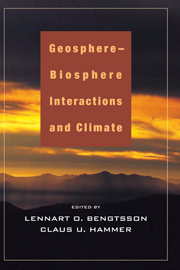Book contents
- Frontmatter
- Contents
- Dedication to Hans Oeschger
- List of Contributors
- Preface
- Introduction
- 1 The Antarctic Ozone Hole, a Human-Caused Chemical Instability in the Stratosphere: What Should We Learn from It?
- PART ONE THE ANTHROPOGENIC PROBLEM
- PART TWO THE HUMAN PERSPECTIVE
- 6 Global Climate Change in the Human Perspective
- PART THREE MODELING THE EARTH'S SYSTEM
- PART FOUR INFORMATION FROM THE PAST
- PART FIVE HOW TO MEET THE CHALLENGE
- Index
- Plate section
6 - Global Climate Change in the Human Perspective
Published online by Cambridge University Press: 04 August 2010
- Frontmatter
- Contents
- Dedication to Hans Oeschger
- List of Contributors
- Preface
- Introduction
- 1 The Antarctic Ozone Hole, a Human-Caused Chemical Instability in the Stratosphere: What Should We Learn from It?
- PART ONE THE ANTHROPOGENIC PROBLEM
- PART TWO THE HUMAN PERSPECTIVE
- 6 Global Climate Change in the Human Perspective
- PART THREE MODELING THE EARTH'S SYSTEM
- PART FOUR INFORMATION FROM THE PAST
- PART FIVE HOW TO MEET THE CHALLENGE
- Index
- Plate section
Summary
ABSTRACT
What does it mean to consider climate change in the human perspective? Throughout human history, climate has both promoted and constrained human activity. In fact, humans only very recently have been able to reduce their dependence on climate through advances in technology and organization. The other consideration in the discussion of climate change in the human perspective is how human action affects climate. Are our actions causing the climate to change in ways or at rates that will threaten natural systems or make human adaptations difficult? What actions can we or should we take to alleviate the effects of human action on climate change? To approach these questions, we often use mathematical modeling and computer simulation general circulation models (GCM) to aid our understanding of the relationship between human action and global climate change. Integrated assessment models (IAM) are important tools to study the impacts of climate change on the environment and society as well as the costs and benefits of various policy options and decisions.
I present a brief overview of the climate debate, modeling, and the current understanding of the climate processes. I discuss how IAMs evaluate the effects of humaninduced climate change and the implications of policy options. Finally, I suggest areas for further consideration.
- Type
- Chapter
- Information
- Geosphere-Biosphere Interactions and Climate , pp. 83 - 110Publisher: Cambridge University PressPrint publication year: 2001



